2024 Annual Meeting
In This Section
To read an article, please click on the down arrow to the right of the article title.
Note: On-demand recordings will be available after November 8.
 President’s Message – Kim Van Voorhis – Annual Meeting 2024
President’s Message – Kim Van Voorhis – Annual Meeting 2024
Kim Van Voorhis
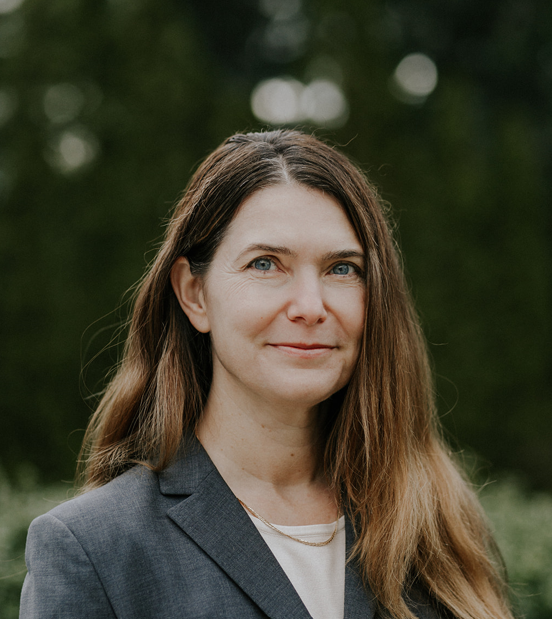
Thank you for the wonderful inauguration celebration at the Annual Meeting, and Welcome to AIPLA’24-25!
Like the inspiring “Queen Ann” before me, Brian Batzli before Ann, Patrick Coyne before Brian, and all the Past Presidents who have shared this honor, I am grateful for and humbled by the opportunity to lead one of the most respected and influential IP organizations in the world.
Picking up on the last words of Ann’s presidential message in 2023 and one that she repeated throughout her presidency: Let’s have fun. True to her word, Ann has breathed renewed life, energy and fun into our organization’s work. From leading a 4+ hour Board meeting by Zoom, to vetting strategic policy considerations, to showing off her prom party moves on many a Stated Meeting dance floor, Ann’s quick wit, humble nature, and overwhelming kindness have truly made AIPLA more “fun.” Thank you, Ann.
And thank you to all those who, despite a global pandemic, made sure that this incredible organization continued to serve as a strong and guiding voice in the global IP community. With a dedicated staff, strong leadership from our Board and committees, and a diverse and committed membership, we have emerged from the pandemic stronger, nimbler, and more sharply focused on our mission to foster innovation, creativity, and fair competition in the U.S. and around the globe.
So now that we are all having more fun in an organization that is stronger than ever, what could possibly be next? With all this momentum, the answer to me can only be one thing —we focus on what we do best, and we do it even better.
Let’s talk about that. What do we do best?
We are advocates. As a member of AIPLA for nearly 25 years, I have had a front row seat for some of the most significant developments in global IP law in recent history—the enactment of AIA, the ever-swinging pendulum of Section 101, Supreme Court trends and the caselaw that has built up around them, the Trademark Dilution Act and the Trademark Modernization Act, copyright modernization, progress on global harmonization, the challenges of digital commerce, and the recent infiltration of AI into everything we do. All these issues, passing through multiple administrations, each with a different viewpoint and different priorities. And with every issue, AIPLA digs deep. We weigh impact, we listen to one another and respectfully consider all points of view, and we offer practical solutions that are routinely considered by IP stakeholders and policy makers in the U.S. and beyond.
We are experts. We can tackle the most complex issues because we are experts. And like any good mentor or coach, we don’t just keep our advocacy expertise and deep bench of IP knowledge to ourselves. We share it with others. From live content at Stated Meetings, to online programs, roadshows, bootcamps, training guides, and practice tips, AIPLA has some of the strongest, most comprehensive educational offerings, making us one of the most trusted sources for IP education.
We are a community. Above all else, we are a community of professionals, united by our shared passion for the work that we do and how we do it. We show up, we engage, we listen, and we learn. As a community, we can deliver impactful messages with a stronger voice. As a community, we can support one another and our well-being by ensuring that IP practitioners are not only producing high quality work products and delivering results but are also enjoying ourselves and all that life has to offer along the way. As a community, we can give back so that generations to come will continue to engage the abundance of bright and capable leaders that we have today.
The common thread and what continues to drive each of these core principles--advocacy, education and community—is you, our membership. Our members are the advocates, our members are the experts, and our members are the community that we all cherish. Our members are also the key to our future success; a robust and engaged membership will unlock our ability to do all the great work we already do, even better. It should come as no surprise, then, that membership is among my top priorities for the upcoming year.
Fortunately, we are hitting the ground running. In recent years, we have expanded our membership to better meet the needs of the diverse and expanding IP community. We have welcomed patent agents and licensing professionals, and we are seeing more corporate members than ever before. This coming year, we are expanding our reach across more international communities and exploring deeper connections in Dubai, Africa and India, and have newly renamed the Asia Pacific Committee (formerly the IP in the Far East Committee) as the importance of IP grows around the world.
In terms of building our expertise and advocacy, we lean on our committees and have established task forces of member experts to help us stay on top of critical, evolving issues such as patent eligibility and accessibility, the impacts of recent APA decisions, harmonization, and generative AI. We have realigned and re-energized our committees to make sure we stay focused on issues that are front of mind for IP practitioners in today’s global economy. We are also continuing to review how we come together as an organization—our meeting structure, how we develop future leaders, the types of education we offer, and how we deliver it. We are listening, we are ideating and evolving, and we aren’t slowing down.
We are also doubling down on our commitment to law students and building a robust pipeline of future IP leaders. For law students, where AIPLA membership is now free, our newly formed Special Committee on Law Student Engagement kicked off at the Annual Meeting, where we welcomed 80+ law students as attendees. The Committee will continue to work with students throughout the year to ensure a smooth transition from law school to their IP careers. For members looking to build their leadership skills, check out AIPLA’s first-ever Leadership Forum, a two-day, immersive experience designed to elevate leadership skills at any stage of your career and to inspire others to do the same. Check out the Leadership Forum page for more details on how to attend this special event.
How can we continue to make AIPLA even better? As your President for the next year, I along with AIPLA’s Executive Committee, Board of Directors, committee leaders, and staff will ask this question in everything we do, and we will challenge you to do the same: How can we do better for ourselves, better for AIPLA and better for the IP community? It can be as simple as joining a new committee, attending a new meeting, online program or road show, launching a sub-committee on a new initiative, or just leaning in and learning more in an emerging area of interest. Be creative, raise your hand, support your colleagues, and as Ann would say, have fun!
Looking forward to a productive ‘24-25.
_____________________________________________________________________________________________________________________________
Kim's longtime friend and mentor, Jim Pooley, is pleased to introduce Kim:
How can someone be infinitely serious and fun at the same time?
I still remember well the day that I met Kim Van Voorhis, a recently graduated associate brought in as part of our IP litigation group at Gray Cary in Palo Alto. I found out that she had registered to take a course to prepare for the patent bar exam, so I was curious about her intention to shift into drafting patents. No, she assured me, she was doing this (on her own time, no less) in order to better understand and prepare herself for patent litigation.
This was Kim, whose initiative, integrity, and perseverance never surprised but always impressed me. I also noticed how much she cared for those around her. She soon became a mentor to other associates, and years later many of our colleagues at AIPLA would remark at how Kim “blended professionalism and humanity” and taught them how to be “resolute without being a jerk,” and how to get the work done while making time for family.
No one can doubt Kim’s work ethic. Her husband Scott Oliver told me that on a recent “Wellness Week” for staff at Nike, Kim spent her time off composing more than sixty letters to AIPLA committee chairs. Anyone who has worked with her knows how organized she is: plan the work, then work the plan, and stick to it
But there’s another side to this remarkable woman, one that accounts for her interest in music, the arts, cooking, and writing screenplays: Kim likes to have fun. And to that dimension of her life she brings the same sort of creativity and focus that characterizes her work. As Scott explained, one of the things that caught his eye when he interviewed her as a law student (yes, theirs was an office romance; more on that later) was that she had chosen to spend her summer not at a law firm, but at the legal department of Universal Studios.
If you ask around, you will find people fortunate enough to have attended the 2005 Midwinter Institute in Orlando, where Kim scripted and appeared in the stage production of “The Wizard’s Apprentice,” along with Wayne Sobon, Bob Armitage, Tom Irving, and Sharon Israel. The nominal purpose of this farcical performance was to teach claim construction, through the medium of a mash-up of “The Apprentice” and Disney’s Fantasia. Kim reportedly stayed up most of the previous night – while expecting her first child – helping to craft and paint the coveted “Golden Broom” prize that she won the next day by trouncing Bob in the contest.
Another example of Kim’s seeking out joy in IP meetings comes from one of the trips to Tokyo by the IP in Japan Committee. By tradition, they all gather for a night of karaoke. According to eyewitnesses on this occasion, Kim brought down the house with her rendition of These Boots Are Made For Walkin’, a song “made famous by Nancy Sinatra but perfected by Kim.”
You might think it not too surprising that a litigator likes to perform and sing, but in addition to all that, Kim is also a terrific cook, plays the bass guitar (she learned to accompany her daughter who also plays guitar), writes screenplays, and works out way more regularly than 98% of us. There is no easy way to categorize her range of interests.
Clearly, Scott is a fortunate guy. He tells me now that they were flirting in the office, but it must have been the most subtle sort possible, which would not really surprise me, given Kim’s general focus on decorum. Indeed, the two of them managed to keep their relationship a complete secret, until that time that we were on trial at the ITC and the fire alarm at the hotel went off in the middle of the night . . .
Although Kim loves Scott, as anyone who really knows her will attest, she is most dedicated to, and adores, her children, Fiona, John and William, who have been known to appear occasionally at an AIPLA dinner dance, and who are affectionately called “The Muffins.” Just ask her about them and you’ll see. Kim has somehow managed to be present and engaged in all aspects of their lives while still meeting her professional obligations.
Kim is a California native, but moved to Omaha for high school, returning to earn a degree in biology/biochemistry from UC Irvine. After that she spent 15 years as an IP trial lawyer. From Gray Cary, we all moved to Milbank and then Morrison & Foerster, and from there Kim went in-house at Nike, where today she manages Nike’s global IP litigation efforts.
Kim’s AIPLA resume can leave you breathless. She came to us very early in her career, and her first leadership role was as Regional, and then National, Director of the Giles Rich Moot Court Competition. From there she went on to chair the Young Lawyers Committee. After that, despite the fact that she was (and is) a registered patent attorney, Kim’s love for trademark law was on full display while serving as Vice Chair and Chair of multiple trademark committees, before her election to the Board. Along the way, Kim found time to help plan the Madrid Protocol Road Show, initiate the Trademark Bootcamp (now in its 15th year), conduct a comprehensive review of AIPLA educational programming, and conceive and co-host the first Committee Fair, for which she shared an AIPLA Project Award. Oh, and she was the Officer-in-Charge for the 125th Anniversary Annual Meeting, for which she shared a second AIPLA Project Award.
It’s no wonder Kim has been called the “Energizer Bunny.”
We pick leaders we hope to rely on not only to do the job, but to inspire the rest of us as an example of creativity, courage, diligence, empathy, and passion. And occasionally we are lucky enough to get all of that wrapped up in someone whose playfulness helps us to fully see one another as family.
Members of AIPLA, please welcome your new President, Kim Van Voorhis!
 Director Vidal Addresses USPTO System Integrity, Enhancing Efficiency, and AI
Director Vidal Addresses USPTO System Integrity, Enhancing Efficiency, and AI
.jpg?sfvrsn=729c608c_1)
At the Opening Plenary, USPTO Director Kathi Vidal addressed multiple critical challenges and initiatives underway at the USPTO. She began by discussing recent IT issues, including a patent term adjustment software error and a data exposure incident. Vidal emphasized the USPTO’s commitment to transparency, while also detailing ongoing efforts to upgrade outdated systems, improve security through "friendly hacking," and migrate to cloud infrastructure.
One area of concern was the fraudulent use of S-signatures, leading the USPTO to terminate proceedings on approximately 3,100 applications. Vidal highlighted the agency’s dedication to safeguarding system integrity, mentioning that foreign adversaries frequently attempt to exploit vulnerabilities. She noted that the Office leverages AI to detect abuses and plans to expand its technology-driven protections.
Vidal also addressed recent changes to PTAB procedures, including updates on Director Review, amendment processes, and practitioner eligibility. She expressed the USPTO’s commitment to making decisions shaped by public opinion, and addressing concerns, especially around the cost and accessibility of PTAB proceedings.
The USPTO is also increasingly using AI in patent examination processes to assist with routing and prior art searches. Vidal underscored the importance of responsible AI use, emphasizing the need for safeguards to prevent misuse by large, well-funded entities.
Vidal also discussed the recent collective bargaining agreement the USPTO signed - the first in over 24 years, aiming to address the trademark backlog and reduce fraudulent filings. This agreement, Vidal explained, includes pro-employee incentives that have already begun to boost productivity.
Finally, Vidal expressed concern for communities affected by the recent hurricanes, underscoring the USPTO's commitment to supporting its workforce during such crises. She pointed out the Office’s ongoing efforts to address IP initiatives in the environmental and sustainability space
 Register Perlmutter on Modernizing the Copyright Office and Navigating AI Challenges
Register Perlmutter on Modernizing the Copyright Office and Navigating AI Challenges
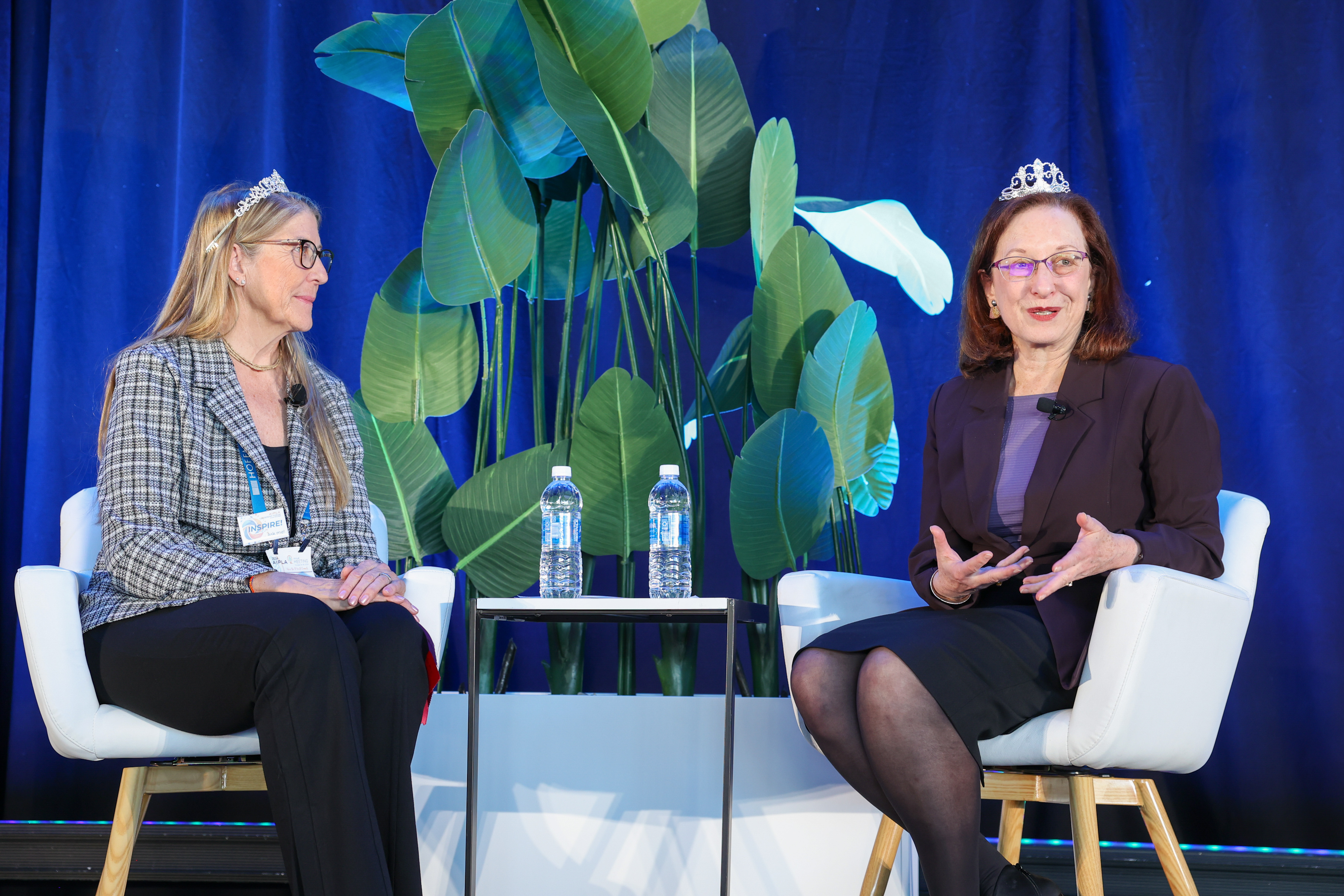
At Friday’s Keynote Luncheon, outgoing President Ann Mueting sat down with Shira Perlmutter, Register of Copyrights, to discuss her role and the office’s strategic priorities. Now in her fourth year, Perlmutter highlighted her initiatives to increase accessibility to copyright, modernize Office systems, provide impartial legal guidance, and improve data usage for policymaking and public research. Key achievements include launching the first IP Small Claims Tribunal, transitioning outdated systems to digital platforms, appointing a chief economist, reducing processing times, and addressing the complex copyright issues brought on by AI. She underscored the Office's commitment to upholding human authorship in copyright, advising applicants to disclaim rights over AI-generated content where relevant.
Perlmutter also covered the progress of the Copyright Claims Board, which has processed nearly a thousand claims, with most claimants representing themselves—a reflection of Congress’s aim to make copyright justice accessible. She further commended the Office’s new Chief Economist, Dr. Brent Lutes, and his team for their impactful studies on gender participation in copyright, the pandemic’s impact on copyright industries, and the geographic distribution of copyright registrations. The Office is also addressing evolving topics such as NFTs and AI in copyright filings, noting a drop in NFT applications but sustained interest in AI-influenced content. In outreach, the Office has actively engaged underserved communities through events, partnerships with the USPTO, and enhanced accessibility efforts with the National Library Service for the Blind.
 Dr. Robert Bryant on IP, Gatekeepers, and the Future of Invention
Dr. Robert Bryant on IP, Gatekeepers, and the Future of Invention
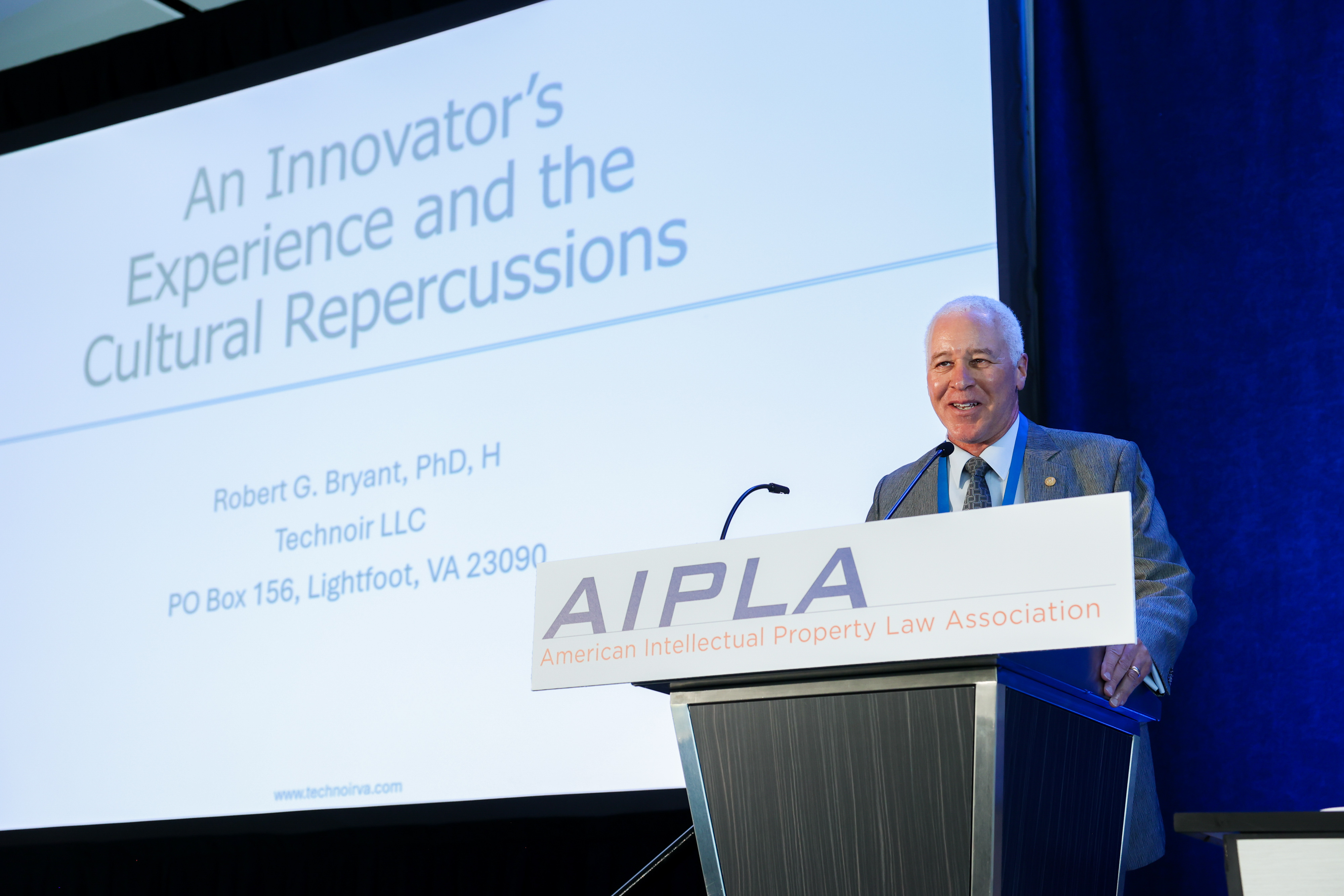
In his keynote, Dr. Robert Bryant shared his journey as a NASA inventor, emphasizing the role of IP in bringing innovations, like his redesigned pacemaker, to market. He discussed societal barriers to innovation, describing how gatekeepers in science often stifle disruptive ideas, noting that “professional jealousy is the highest compliment you will get as an inventor.” Bryant argued that while stability promotes structured thinking, it limits creativity, as seen in the U.S. education system, which lags globally despite high investment.
Using “Technology Readiness Levels” (TRLs), he explained that inventors often stall at early stages, while innovators bring ideas to market despite high risks. Bryant criticized “groupthink” and highlighted failures to show the dangers of ignoring innovation. He also questioned the utility of billion-dollar inventions with limited applications, advocating for more resource-conscious development. Lastly, he promoted the National Inventors Hall of Fame’s efforts to support young inventors, noting that a thriving IP landscape relies on fostering innovation and resisting gatekeepers who hinder progress.
 The Impact of Chevron's Reversal on IP and Administrative Law
The Impact of Chevron's Reversal on IP and Administrative Law
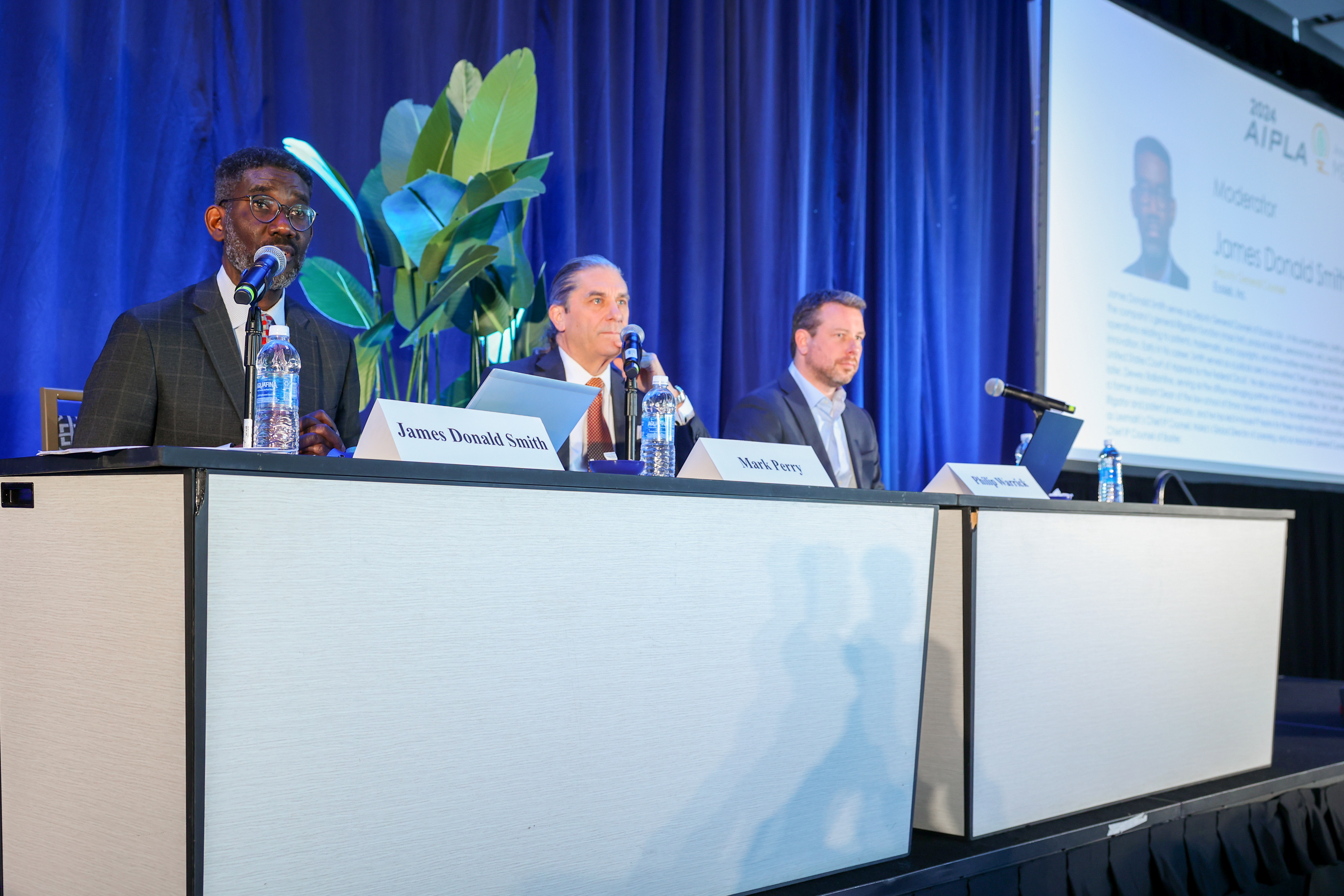
During Friday morning plenary, a panel of three experts, including James Donald Smith of Ecolab USA, Mark Perry of Weil, and Philip Warrick of Irell & Manella LLP, examined the recent Supreme Court decision overturning Chevron deference and its impact on administrative law, especially concerning IP law. The discussion opened by addressing the Supreme Court’s pattern of reassessing previous rulings, focusing on Chevron, a pivotal case in administrative law that had granted federal agencies significant interpretative authority. The recent reversal in Loper Bright Enterprises signals a shift towards courts asserting greater control over statutory interpretation, reducing reliance on agency expertise.
Perry traced Chevron’s origins as a two-step process that evolved into an influential but contentious legal doctrine affecting various agency rulings and sparking ongoing debate in the courts. The panel also examined the implications for IP-related agencies, like the USPTO and ITC, suggesting their decisions might face heightened judicial scrutiny in the absence of Chevron deference. Philip proposed that, while the USPTO's rulings might not be directly impacted, agency rules and policies could see more legal challenges, potentially leading to less consistency and predictability in administrative decisions.
The conversation also highlighted Congress’s possible role in drafting clearer statutes to reduce the need for judicial interpretation. With Chevron’s departure, Skidmore deference—a standard based on persuasiveness rather than automatic deference—could become more relevant, although it may bring about additional disputes over agency interpretations. The panelists ultimately framed the Supreme Court’s decision as part of an ongoing rebalancing of power among government branches, with potential ripple effects across regulatory and legislative processes that could reshape the broader legal landscape.
 Committee Spotlight
Committee Spotlight
Women in IP Law Committee Breakfast
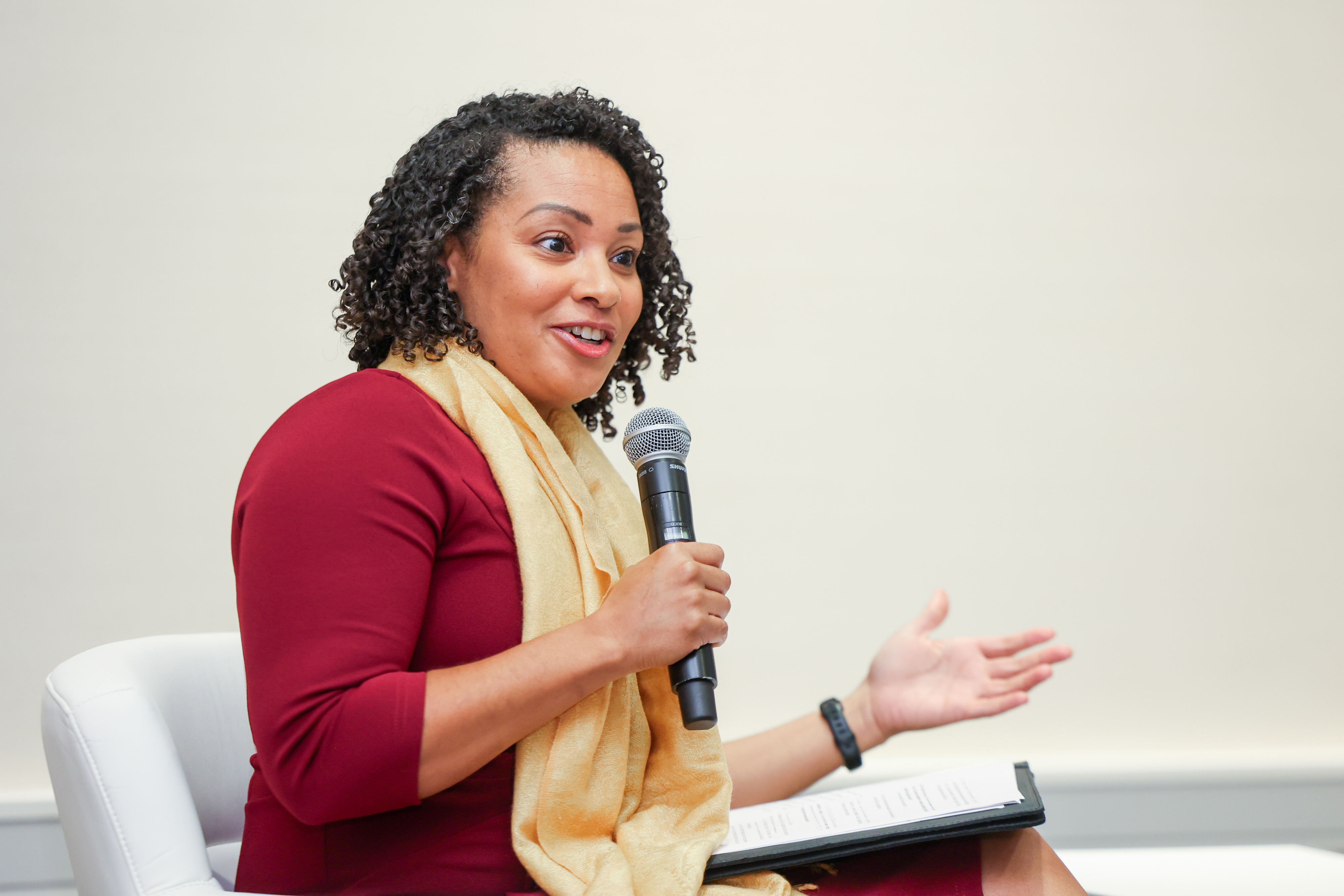
The Women in IP Law Committee held their sold-out breakfast at the AIPLA Annual Meeting. Women in IP Law Vice Chair Michelle Fabry sat down with Kandis Gibson, Immediate Past-President of the Women’s Bar Association of DC, for a fireside chat on Empowering Women in Law: Strategies for Effective Leadership and Sustainable Success Without Burnout. Key takeaways from their discussion:
- Burnout and dissatisfaction oftentimes push women out of the profession or bring on destructive behaviors
- Leaders need to model the behavior we want to see in our organizations.
- You can’t live burnout culture while recommending balance
- Going beyond lip service and being intentional about self-care
- Adopting growth mindsets when it comes to leadership style
- Leaders need to ask whether their organizations’ practices support women
- Our organizations need to live the policies organizations talk about on their websites
- Leaders must understand that there are different paths forward and you can support and mentor even if someone gets there on a different road
Corporate Practice Committee Breakfast
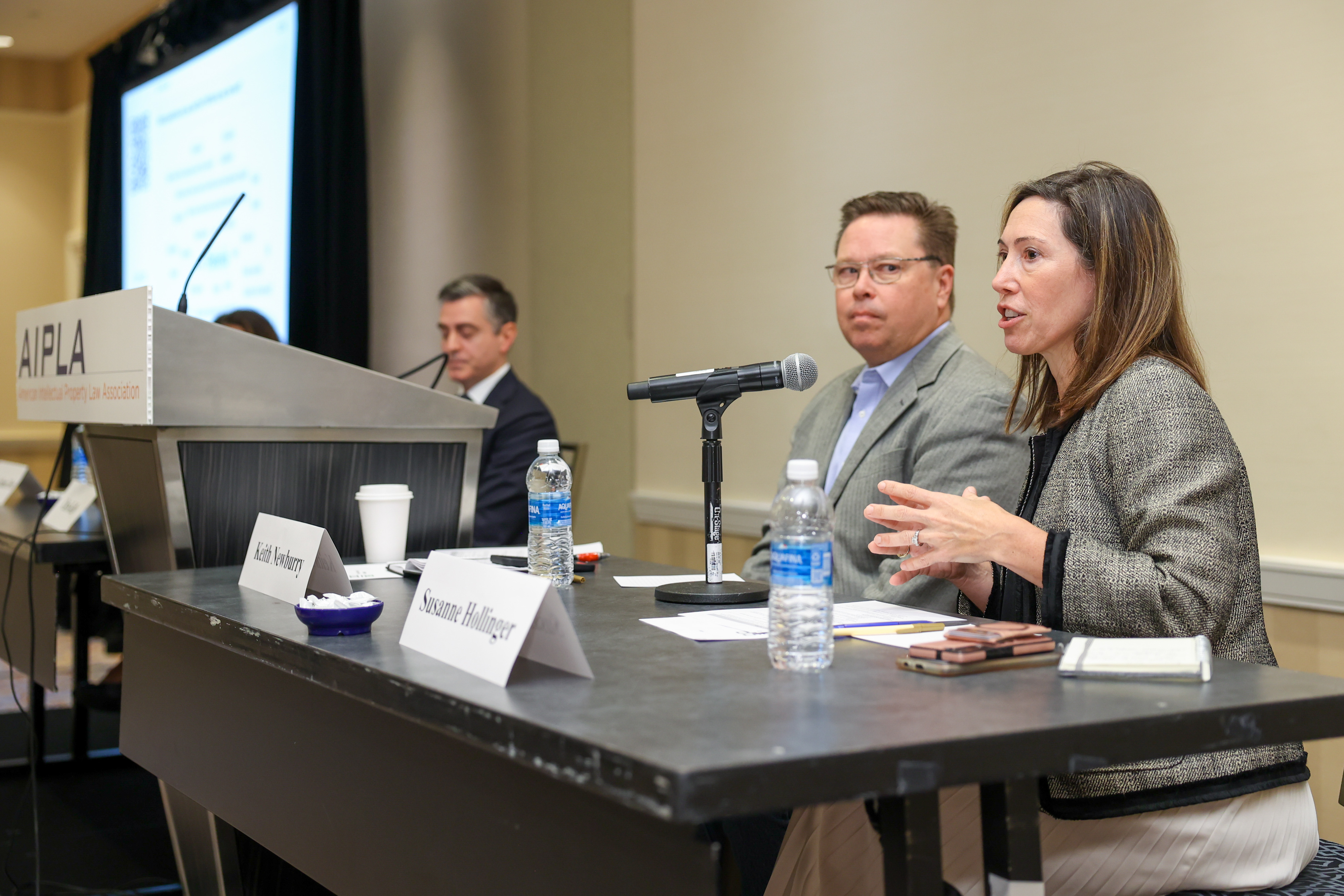
The 2024 Corporate Practice Breakfast gathered members for a morning of networking, appreciation, and expert insights. The event began with the presentation of the Women Innovators Award (presented on behalf of the AIPLA Women in IP committee) to Tolmar Inc., recognizing the company's outstanding commitment to engaging women in its IP initiatives. Tolmar’s Angela Sebor accepted the award on its behalf, underscoring the company’s dedication to diversity in intellectual property.
The morning continued with a panel discussion on "IP Pitfalls in Mergers and Acquisitions," with expert IP leaders:
- Susanne Hollinger, Chief Intellectual Property Counsel at Newell Brands
- Keith Newburry, Founder of Newburry Strategic Advisory
- Shaila Lakhani Ohri, Senior Vice President, General Counsel at Uplight
- Chris Kelly (Moderator), Principal at Meunier Carlin & Curfman
This engaging discussion covered best practices and common pitfalls in managing IP during M&A transactions. Panelists addressed diverse scenarios, from open-source software to consumer and medical products, and examined IP concerns across small to large-scale mergers. Attendees gained and shared valuable strategies for navigating IP challenges in complex M&A landscapes, leaving them equipped with practical knowledge to apply in their organizations.
 Spotlight on FADIPL Scholars
Spotlight on FADIPL Scholars
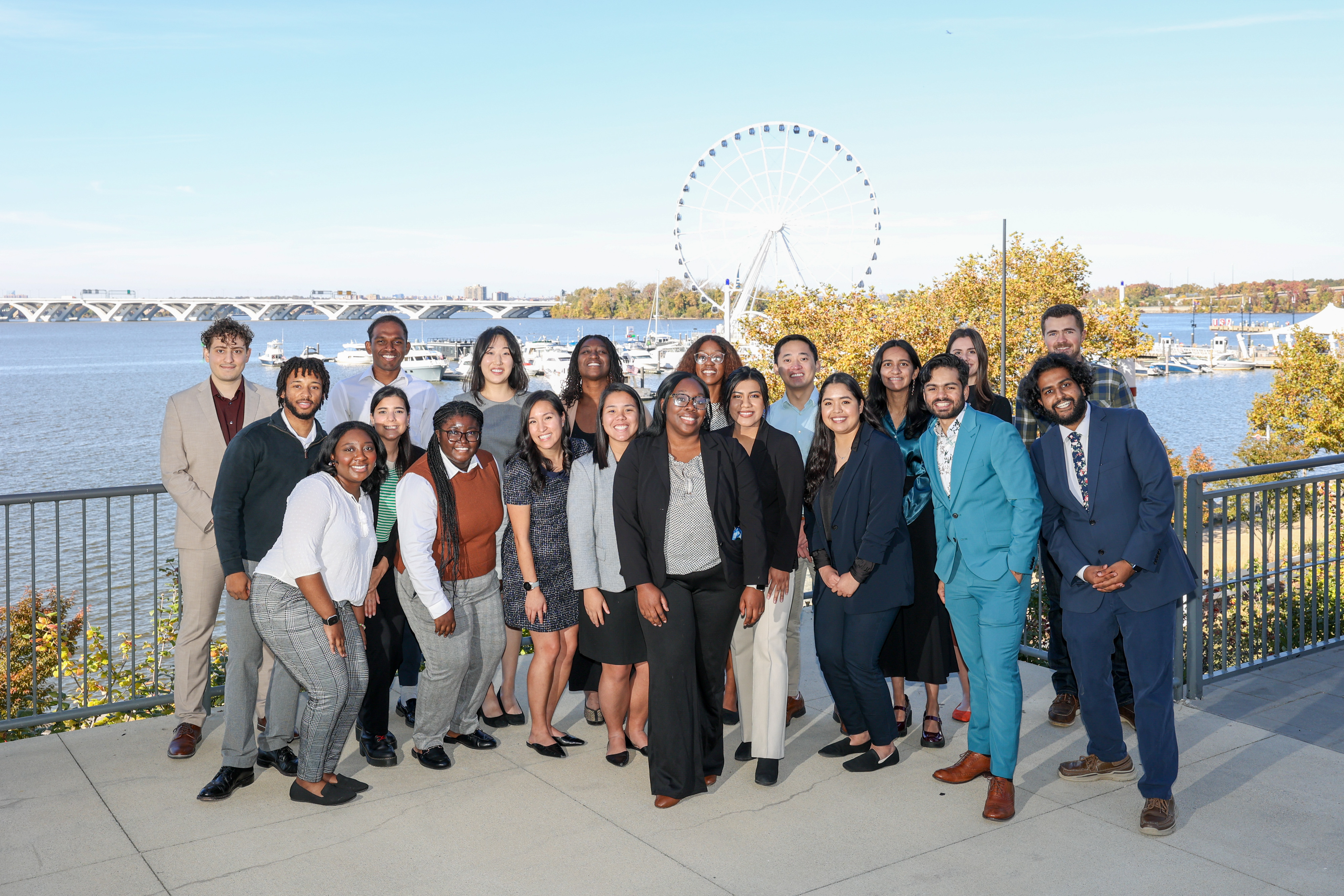
The 2024 AIPLA Annual Meeting marked my first meeting as a member, and it was truly remarkable. The event was eloquently planned, from the speakers to the venue at the National Harbor. I had numerous opportunities to network with both seasoned and newer IP attorneys. In particular, the speed networking event was fantastic, as I met many attorneys eager to hear about my experiences as a law student. I also really enjoyed the Women in IP Law Committee Breakfast. Seeing so many women who have forged paths for others was both inspiring and encouraging. As a first-generation law student, this experience was especially meaningful and reaffirmed my desire to become a patent attorney. Law school is a significant challenge, but I made valuable connections during the Annual Meeting that I will cherish throughout my law student career and beyond. Thank you to the AIPLA for organizing this transformative Annual Meeting, and thanks to the Foundation for Advancement of Diversity in IP Law for supporting me on my journey and allowing me to experience this Annual Meeting for myself. - Tia Smith, Law Student at The University of Detroit Mercy School of Law
__________________________________________________________________________________________________________________________
As a Sidney B. Williams Scholar and first-year law student with a background in engineering, the Annual Meeting was my first real dive into the world of Intellectual Property law. Engaging with professionals from law firms, the USPTO, in-house teams, and solo practices gave me a clear view of the diverse paths within IP that I had not fully grasped before. Meeting the vendors who showcased emerging technologies in patent drafting and attending talks such as how artificial intelligence within inventing can affect patentability made the application of IP law more tangible. These experiences have only increased my desire to become an IP attorney within this diverse space, and that is due to this conference's incredible organizers and attendees. - Ferris Dweik, Law Student at Boston University School of Law
 AM24 Photos
AM24 Photos
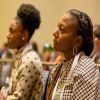 Upcoming Events
Upcoming Events
 Upcoming Webinars
Upcoming Webinars
 New Members
New Members
Upcoming Events
-
.png?sfvrsn=9aa26827_1) 2026 AIPLA Virtual Corporate Practice Institute
2026 AIPLA Virtual Corporate Practice Institute
January 13 to 20, 2026 | Up to 360 Minutes of CLE
The Corporate Practice Institute is not a bootcamp. This program provides in-depth insight for in-house corporate counsel and agents to learn about wide ranging legal issues affecting their practice from experienced practitioners. It is designed for experienced in-house attorneys and new in-house attorneys learning to manage new corporate environments and challenges not taught in law schools or private practice. The Institute also helps private practice attorneys, especially associates, prepare for potential in-house career moves. The program also provides valuable networking opportunities to connect with each other and learn from each other's experiences. This online, CLE-program spans two half-days, from Noon – 5:00 pm Eastern and includes 3 one-hour education sessions and a networking session each day. -
 AIPLA CLE Webinar: Regulation, Risk & Resilience: The Nexus Between Professional Liability, Duty of Competence & Practitioner Well-Being
AIPLA CLE Webinar: Regulation, Risk & Resilience: The Nexus Between Professional Liability, Duty of Competence & Practitioner Well-Being
February 10, 2026 12:30 PM to 2:00 PM | Eligible for up to 90 Mins CLE
Mental health issues and substance use disorders can affect any practitioner, in any setting, and at any time. Left untreated, they can destroy careers and lives. This program will discuss where the legal profession currently stands in relation to the substantial challenges presented by untreated mental health issues and substance use disorders and examine the nexus between ethical competence under the USPTO Rules of Professional Conduct and practitioner well-being. This program will educate attendees on how to recognize the signs of an impaired attorney, how to approach the colleague and begin a conversation, and discuss the possible disciplinary and professional liability implications of an impaired practitioner’s conduct. In addition, the speakers will present best practices/effective risk management strategies, preventative measures, and proposed policy and well-being initiatives, that practitioners in any practice setting may implement to protect clients, themselves, and other firm members as well as save careers. -
.png?sfvrsn=fb5905da_1) 2026 IP Transactions Bootcamp
2026 IP Transactions Bootcamp
February 12, 2026
This in-person bootcamp is designed to provide practical insights and strategies for professionals working in intellectual property transactions. The day features a comprehensive agenda including: Panels and CLE Sessions: Learn about Working with Tech Transfer Offices, Strategies for successful collaborations between nonprofits and industry, and Protecting and monetizing an AI asset. Drafting and Negotiating Tips: Get practical advice on drafting and negotiating strategic collaboration and license agreements. Hands-on Workshop: Participate in a Mock licensing negotiation to put your skills to the test. Networking: Conclude the day with a dedicated Networking reception. -
2026 Patent Prosecution Boot Camp - Arlington, VA
March 4 to 6, 2026 | Up to 1235 minutes, including 60 Ethics minutes
The 2026 Patent Prosecution Boot Camp is a comprehensive, CLE-accredited seminar that includes instructional lecture-style sessions with practical tips on U.S. and international patent preparation and prosecution, as well as hands-on interactive workshops that will walk you through drafting claims and responding to office actions. -
-(1).png?sfvrsn=7a1054_1) 2026 Trade Secret Summit
2026 Trade Secret Summit
March 26 to 27, 2026
The AIPLA Trade Secret Summit is the leading trade secret conference in the nation, with speakers from across the spectrum of private practitioners, in-house counsel, government, and academia, as well as fantastic networking opportunities. CLE credits will be available.

